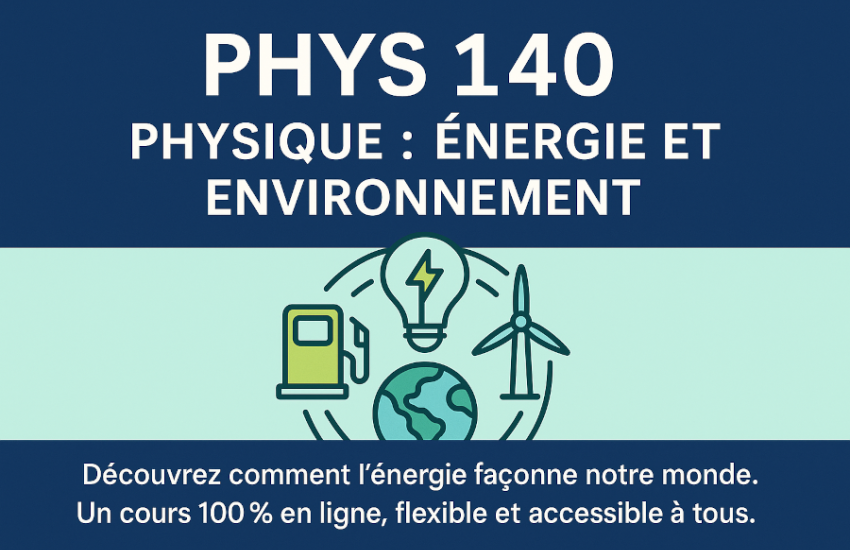PHYS 140 - Physics: Energy & Environment
Discover Tomorrow's Energy Challenges - Without Complex Equations! The PHYS 140 - Physics: Energy and Environment course invites you to explore crucial questions about energy, climate change, and our collective future. Designed for all University of Regina students - regardless of your field of study, faculty or discipline - this 100% online, fully asynchronous French-language course focuses on concepts rather than calculations. You don't need advanced physics or mathematics knowledge to enroll.
Through discussions, case studies, and free online resources, you'll examine:
- Where the energy we consume comes from
- Environmental impacts of fossil fuels vs renewable energy
- Links between energy, poverty and climate justice
- Emerging solutions for a sustainable future
No textbooks to buy - all materials are available free online!

What You'll Learn
By the end of the course, you'll be able to:
• Explain what energy is and how it's used
• Identify advantages/disadvantages of different energy sources
• Understand how electricity is produced and distributed
• Analyze the relationship between energy consumption and climate change
• Evaluate environmental and social consequences of energy choices
Assessment
• Group discussions: 10%
• Assignments: 35%
• Midterm 1: 15%
• Midterm 2: 15%
• Final exam: 25%
*All exams are take-home with 24 hours to complete them.*
Course Outline (Weekly Themes)
- Modeling energy and matter
- Ambient, primary and end-use energy
- Energy for society
- Heat
- Thermal machines
- Fossil fuels
- Environmental consequences
- Climate change
- Nuclear energy
- Renewable energy and electricity
Access course materials free here: https://energyeducation.ca/Encyclopedie_Energie
Accessibility
Students needing accommodations can contact the Student Accessibility Centre: https://www.uregina.ca/accessibility/student/index.html
FAQ
1. Do I need physics or math background?
This course is designed in such a way that high school–level science and math knowledge is sufficient as a prerequisite.
2. How many hours per week should I plan for?
About 3-5 hours per week (readings, assignments, and discussions). The asynchronous format lets you work at your own pace.
3. Are exams proctored?
No. Exams are take-home with a 24-hour window to complete them. You can use your notes and course materials.
4. Does this course count for credit?
Yes! PHYS 140 counts as a science credit for many programs (e.g. environmental studies, liberal arts). Check with your academic advisor.
5. How is this different from other physics courses?
The focus is on societal and environmental issues, not calculations. No textbooks to buy - everything is online and free!
6. Can I take this if I'm not fluent in French?
The course is taught in French, but written resources are clear and accessible. An English version is also offered - inquire with the Faculty of Science.







